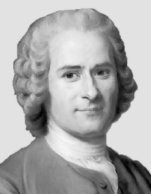|
性行為的發展
|
|
性行為的發展阶段:
兒童期的性行為發展階段 |
|
兒童期的性行為發展 |
 |
|
讓-雅各·盧梭(Jean-Jacques
Rousseau,1712-1778)
盧梭為瑞士日內瓦人,也作為作家和作曲家僑居法國和英國。他提出了兒童的性“純潔”的觀點,並且要求青少年應該防止出現性好奇。 |
|
Jean-Jacques Rousseau
(1712-1778), a native of Geneva, also lived in France and England as a famous writer and composer. He supported the sexual “innocence“of children and demanded that adolescents should be protected from their own sexual curiosity. |
|
|
在闡述兒童期的性行為發展具體細節之前,回憶有關兒童的性行為發展的歷史背景也許是有用的:在古代和中世紀,兒童被看作“小大人(miniature
adult)”,他們會盡力參與所有的日常活動。直到18、19世紀,歐洲和美國的中產階級才開始發覺兒童期為一個帶有其自身需要和規律的特殊而“天真的”生命時期。(他們也發覺),甚至隨著時間的推移,青春期會轉入一個特殊和(需要)“被保護的”時期。青春期成為介於兒童期與成年期之間的一個冗長的從屬時期,在這個時期,(社會文化)會要求青少年要保持性節制。
“啟蒙時代”最重要的作家之一的讓-雅各·盧梭(Jean-Jacques
Rousseau)就寫過一部有重大影響的著作。在這部著作《愛彌兒或論教育》(Emile
or On Education,
1762)裏,盧梭宣稱兒童天生就是“聖潔無邪的”,為了他們自身的利益,必須要維持他們的性無知(sexual
ignorance)狀態。青春期之後,性知識只有在回答直接的問題時才能給予解答,即使在那時,通過設法把這個議題弄得使青少年感到厭惡來阻塞他們的進一步好奇才是明智的。如果教育者壓制性器官及其功能與最令人厭惡的勃起方面的聯繫,這也許是最好的教育方式。另一方面,青少年必須要小心翼翼,以避免喚起不成熟的任何過於明顯的性衝動。青少年的“自然”清純與成人社會的墮落影響隔離得越長久越好。
盧梭的教育思想對一代又一代的教育者發揮了巨大的影響,而且繼而,這些教育者於19世紀把性壓抑推向了登峰造極的程度。 |
|
Development of Sexual Behavior |
|
Stages of Development |
|
Childhood |
|
Before going into
concrete details about childhood sexual
|
development, it may be useful to recall their historical background: In ancient and medieval times, children were seen as “miniature adults” who participated in all daily activities as best they could. It was not until the 18th and 19th centuries, that the the European and American middle classes began to discover childhood as a special, “innocent” phase of life with its own needs and rules. Indeed, in the course of time, even adolescence turned into such a special, “protected” phase. It became an ever-lengthening period of dependency between childhood and adulthood in which young people were expected to remain sexually abstinent.
A seminal book in this respect was written by
Jean-Jacques Rousseau, one of the most important authors of the “age of enlightenment”. In “Emile or On Education” (1762), he declared that children were born in a state of "holy innocence", and that their sexual ignorance had to be preserved for their own good. After puberty, sexual information was to be given only in answer to direct questions, but even then it was advisable to stifle further curiosity by making the adolescent disgusted with the subject. Perhaps it was best if the educator stressed the connection of the sex organs and their functions with the most repulsive aspects of excretion. On the other hand, one had to be careful not to arouse any premature passions by becoming too explicit. A single inappropriate remark could ruin a pupil's life. For as long as possible, the “natural” innocence of youth needed to be protected from the corrupting influence of adult society.
Rousseau’s ideas exerted an enormous influence over generations of educators, and they, in turn, greatly
contributed to the sexually repressive climate of the 19th century. |